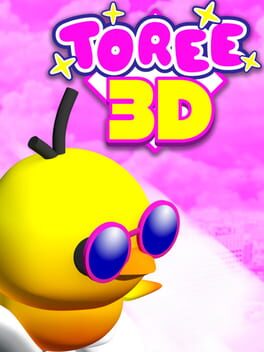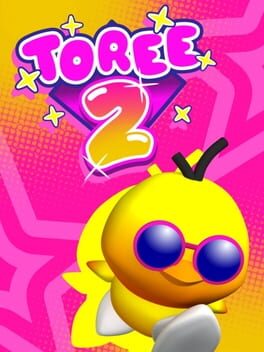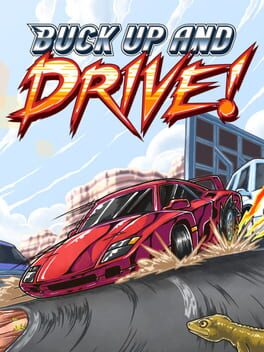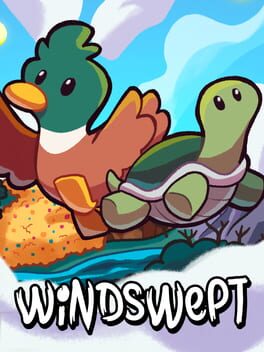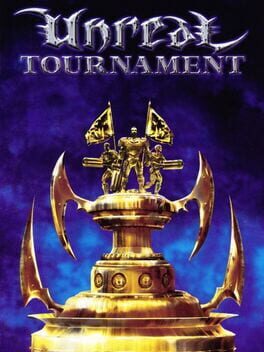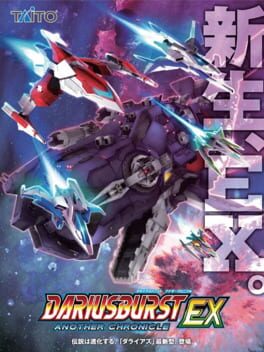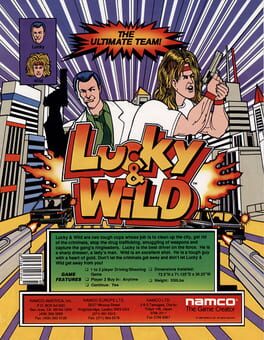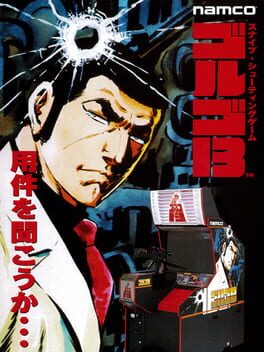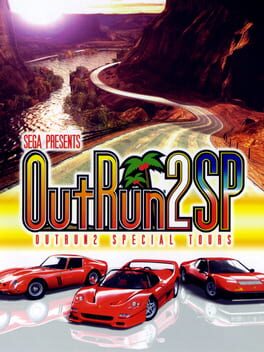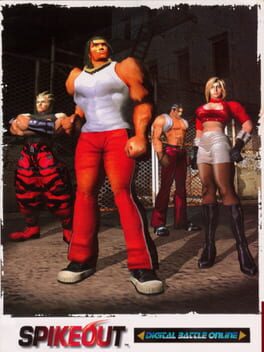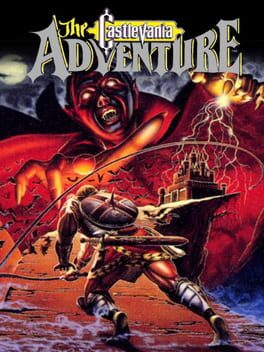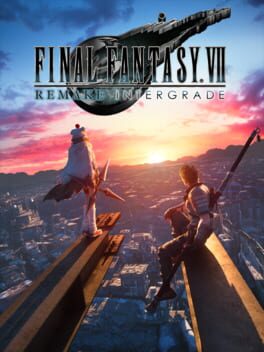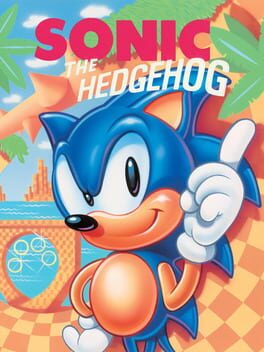ogremode
2021
2021
2021
TBD
1999
Somebody hid this game on a network shared drive at my high school and I was in a computer lab class that was meant for taking online community college courses--we spent so much time instead playing this game on LAN. Even the nongamers in the class would join. One of my favorite gaming experiences in my entire life.
Decent STG, real draw is the huge ass cabinet and the double screen presentation of the Darius series. Great music. Made me realize the spectacle and experience has always been the selling feature of Darius, which aren't ever the most interesting or challenging STG games. You want to go back and play it at the arcade so you can get your hair blown back. Now that arcades at least in the US are generally enthusiast spaces, the cabinet doesn't feel nearly as exciting as whatever classic you're there to play. But it's a cool memorable time, an artifact of the period where arcade machines were fighting to produce experiences that home consoles couldn't recreate.
1992
1999
When I start a new Yakuza game, seeing what's available at the arcade is always a top priority, and this game is easily the best surprise I've found in one.
Spike Out is a great feeling 3d brawler, and was directed and produced by Toshihiro Nagoshi, the general director of RGG and one of the main directors of the Kiryu era Yakuza games. There are three attack buttons, and every string variation and button combination leads to a unique move or set of moves. (In the Like a Dragon: Infinite Wealth version, some trigger buttons are mapped to the button combinations, so you can trigger one of those moves without having to input the combination, which itself is somewhat novel.) On top of that, holding one of the buttons during a combo sequence will let off a special move that often stuns enemies, and there are four different special moves depending on how long the charge is held. Finally there are special moves which can be triggered with a button combination, but you can only fire it off if you've picked up a special power up, which you can hold up to four of at once, and I don't think anymore drop from enemies once you're holding four. Enemies also drop health, but it doesn't give much back and they're also rare. There are four playable characters, and each one has an individual and unique moveset, though some are more different than others. The combat genuinely feels great, and I found myself rushing to the next encounter to try out different combos, which suited the clock ticking down rhythm of an arcade brawler very well.
The main character, Spike, spawns with his child holding onto his back, who flies off when you get hit or use one of your special moves. When the child is on the ground, he mimics your moves in a child like manner, which is a really charming touch. The mechanic of the kid flying off reminded me of the "kick me sign" in God Hand--in that game, the main character gets a "kick me sign" slapped on his back in an early stage, and it will fly off when you activate that character's special mode or use one of the special moves, but you can play through the entire game without using those moves, and if you do you're rewarded with music tracks you can play at an in-game jukebox.
While playing Spike Out, I thought, there could surely be a similar challenge run where you never lose the kid on your back, but that seems impossible. Despite the huge variety of combat moves you can use, there are zero defensive moves. You can't block and you can't dodge--you will just get your ass caught in enemy combos and grapples and there's nothing you can do about it. This is where the games arcade origins feels the worst--after the first two stages, enemies do so much damage and come in such quantity that you're doomed to credit feed your way through the game. The game is also absurdly long for an arcade game, about an hour and a half to see every stage. It might be a lot more tolerable in co op, which is the intended experience--the original arcade cabinets could link up so four players could play at individual machines. I got bored and frustrated at the start of the third stage and tapped out, and probably won't ever complete the game. Still, it's a great feeling brawler when the odds aren't completely turned against the player, and absolutely worth piloting Ichiban over to a GIGO to check out.
Spike Out is a great feeling 3d brawler, and was directed and produced by Toshihiro Nagoshi, the general director of RGG and one of the main directors of the Kiryu era Yakuza games. There are three attack buttons, and every string variation and button combination leads to a unique move or set of moves. (In the Like a Dragon: Infinite Wealth version, some trigger buttons are mapped to the button combinations, so you can trigger one of those moves without having to input the combination, which itself is somewhat novel.) On top of that, holding one of the buttons during a combo sequence will let off a special move that often stuns enemies, and there are four different special moves depending on how long the charge is held. Finally there are special moves which can be triggered with a button combination, but you can only fire it off if you've picked up a special power up, which you can hold up to four of at once, and I don't think anymore drop from enemies once you're holding four. Enemies also drop health, but it doesn't give much back and they're also rare. There are four playable characters, and each one has an individual and unique moveset, though some are more different than others. The combat genuinely feels great, and I found myself rushing to the next encounter to try out different combos, which suited the clock ticking down rhythm of an arcade brawler very well.
The main character, Spike, spawns with his child holding onto his back, who flies off when you get hit or use one of your special moves. When the child is on the ground, he mimics your moves in a child like manner, which is a really charming touch. The mechanic of the kid flying off reminded me of the "kick me sign" in God Hand--in that game, the main character gets a "kick me sign" slapped on his back in an early stage, and it will fly off when you activate that character's special mode or use one of the special moves, but you can play through the entire game without using those moves, and if you do you're rewarded with music tracks you can play at an in-game jukebox.
While playing Spike Out, I thought, there could surely be a similar challenge run where you never lose the kid on your back, but that seems impossible. Despite the huge variety of combat moves you can use, there are zero defensive moves. You can't block and you can't dodge--you will just get your ass caught in enemy combos and grapples and there's nothing you can do about it. This is where the games arcade origins feels the worst--after the first two stages, enemies do so much damage and come in such quantity that you're doomed to credit feed your way through the game. The game is also absurdly long for an arcade game, about an hour and a half to see every stage. It might be a lot more tolerable in co op, which is the intended experience--the original arcade cabinets could link up so four players could play at individual machines. I got bored and frustrated at the start of the third stage and tapped out, and probably won't ever complete the game. Still, it's a great feeling brawler when the odds aren't completely turned against the player, and absolutely worth piloting Ichiban over to a GIGO to check out.
Had a great time returning to FF7R. Yuffie was one of my favorite characters in the original game, and one of my main party members—she's a goofy thief who's always trying to steal from the player, but for a good cause. Her characterization in this dlc is great, reframing her as a kid who desperately has to prove herself, while trying and failing to be cool. She's also a lot of fun to play as.
Final Fantasy 7 Remake was already somewhat of a Yakuza game, and that continues here as it wisely reuses the NPCs and locations from the regular game. It looks like the next game will do the same.
I was disappointed that the limit breaks still get interrupted by cut scenes, and end early if you hit whatever the HP mark is to activate the cutscene--it really takes the air out of the combat, and feels at odds with the ATB/limit break/summon bar generation combat flow. The meticulousness of the enemy encounters call for these hard breaks, but I hope the team finds a way of not interrupting your limit breaks in the next game, even if the solution is something like enemy HP getting inflated to compensate for the extra damage done by the limit break animation. This is mostly a slick, polished experience—for me, the FF7R games represent the epitome of AAA gaming, and I'm really looking forward to the next one.
Final Fantasy 7 Remake was already somewhat of a Yakuza game, and that continues here as it wisely reuses the NPCs and locations from the regular game. It looks like the next game will do the same.
I was disappointed that the limit breaks still get interrupted by cut scenes, and end early if you hit whatever the HP mark is to activate the cutscene--it really takes the air out of the combat, and feels at odds with the ATB/limit break/summon bar generation combat flow. The meticulousness of the enemy encounters call for these hard breaks, but I hope the team finds a way of not interrupting your limit breaks in the next game, even if the solution is something like enemy HP getting inflated to compensate for the extra damage done by the limit break animation. This is mostly a slick, polished experience—for me, the FF7R games represent the epitome of AAA gaming, and I'm really looking forward to the next one.
1997
This is the first mainline Final Fantasy game I've ever completed, having only played the Remake, and it's easy to see why this game is so beloved. The characters are cool, the music is great, and its a fun world to explore. Most of the story is presented in the same mode you traverse the world— super deformed versions of the characters on top of painted background images, often from a dramatic angled perspective. The doll like characters give most of this game an almost puppet show feeling, since you're mainly viewing these characters in a diorama mode. There are also more realistic/anime proportioned character models used in battles, and even more realistic versions of the characters used in special cut scenes, which can be genuinely cinematic. The combination of all these styles is fascinating—the variety would be unusual in live action and even animated films, but its taken for granted in video games. It gives the story and presentation a unique air.
I had some problems with playing the game—while the materia system is unique, I found designing and shifting loadouts to be tedious, and it wasn't until late game that the combination system really became interesting. The combat itself I found boring and tedious—there are so many long animations to watch, and the status effects are just annoying and mostly amount to waiting for more animations to be over. I kept waiting for the combat to get good, and while it never really did, my characters were so powerful by end game that battles at least didn't take very long. Still, it was never bad enough to make me throw in the towel, and I'm glad I saw the story through.
I had some problems with playing the game—while the materia system is unique, I found designing and shifting loadouts to be tedious, and it wasn't until late game that the combination system really became interesting. The combat itself I found boring and tedious—there are so many long animations to watch, and the status effects are just annoying and mostly amount to waiting for more animations to be over. I kept waiting for the combat to get good, and while it never really did, my characters were so powerful by end game that battles at least didn't take very long. Still, it was never bad enough to make me throw in the towel, and I'm glad I saw the story through.
1991
A great looking game, good songs, even fun movement, but the levels and enemy placements seem to be purposefully designed to punch you in the nuts every time you're about to have fun. I just finished 100%ing Super Mario World, first replay since I was a kid, and the best of those levels are designed so you can bounce Mario off koopas right through the entire thing—here, every time you jump the developers have cheekily placed a rake for you to land on. Your rings will explode everywhere, and then you'll see above Sonic in huge letters the only word that appears in the game world—"COPE." Sonic is looking into the camera and he is laughing at you.
In the best cases, the levels require slow, thoughtful exploration, and precise platforming, but Sonic doesn't want to do that. He wants to run fast and bounce off bad guys. But half the bad guys have itty bitty hit boxes and will kill you for landing on them if you're a pixel off their head. Why are half the levels underwater, where you move even slower than usual and have to get air constantly? The game clocks in at around two hours if you're not dying constantly, which you will be, and all of these choices feel like they're designed to pad the game out. The game feels at odds with itself.
Sonic as a character, and his animations, are cool and well done. It's easy to see why he caught on; he's a likeable environmentally concerned hero. In general the worlds look good, though the background tiles themselves are unvaried, which makes the slow exploring sometimes confusing.
I don't see myself returning to it—it's just not a fun platformer, and it's not a fun slow action game either. In the platforming space, the closest comparison I can think of is Bonk's Adventure, which is far more accomplished and fun. Where Bonk's Adventure levels are a bit too sparse and easy, Sonic the Hedgehog is too difficult and rarely fun to move through.
In the best cases, the levels require slow, thoughtful exploration, and precise platforming, but Sonic doesn't want to do that. He wants to run fast and bounce off bad guys. But half the bad guys have itty bitty hit boxes and will kill you for landing on them if you're a pixel off their head. Why are half the levels underwater, where you move even slower than usual and have to get air constantly? The game clocks in at around two hours if you're not dying constantly, which you will be, and all of these choices feel like they're designed to pad the game out. The game feels at odds with itself.
Sonic as a character, and his animations, are cool and well done. It's easy to see why he caught on; he's a likeable environmentally concerned hero. In general the worlds look good, though the background tiles themselves are unvaried, which makes the slow exploring sometimes confusing.
I don't see myself returning to it—it's just not a fun platformer, and it's not a fun slow action game either. In the platforming space, the closest comparison I can think of is Bonk's Adventure, which is far more accomplished and fun. Where Bonk's Adventure levels are a bit too sparse and easy, Sonic the Hedgehog is too difficult and rarely fun to move through.
